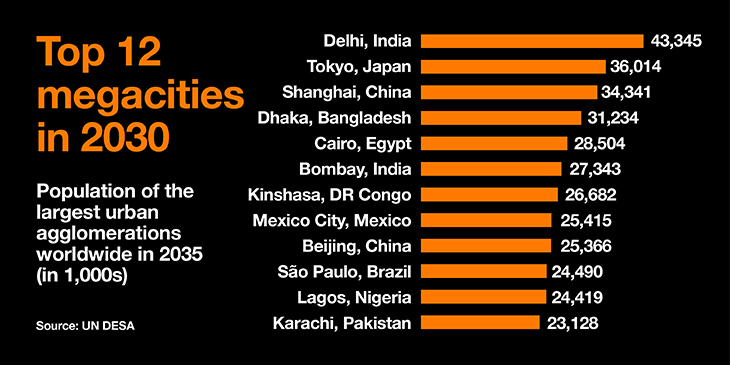A recent survey carried out by the European Commission found that European citizens have very little faith in governments to manage their data responsibly. The report revealed that 68% of British people distrust public authorities to oversee their data securely. With 78% of people saying they don’t trust their governments to handle their personal details, Spain topped the list, followed by Ireland with 73%.
Further research by PwC found that in terms of the private sector, only 21% of consumers say they have increased trust in companies’ use of their data. These numbers are concerning: as more and more people move to cities, data will be the lifeblood of those cities. Both city municipalities and private companies operating city services have work to do.
A financial challenge facing cities
Data was already going to be essential to the development of cities in the future, but it has become even more so on the back of the global pandemic. The National League of Cities recently surveyed over 900 U.S. cities and found that the average U.S. city had a 21% reduction in tax revenues and a 17% increase in costs due to the pandemic. Cities are faced with the challenge of not laying off workers while still providing the services needed in communities. ICT can help cities reduce costs and improve service delivery. Using a data-driven approach will be vital in offering services most cost-effectively.
The role of data in cities
A recent Orange Silicon Valley webinar looked at how responsible use of data and technology will shape the future of cities. The Hello Wednesday - Shaping a more responsible digital world webinar featured speakers from Orange Silicon Valley and other industry stakeholders. It began by stating three central premises:
- COVID-19 will have a lasting effect on human life
- Digital acceleration will be at the core of this lasting effect
- Data will be at the center of that digital acceleration
Data collected through IoT and other sources will play a key role in building the infrastructure of the megacities of 2030. Cities already have mass transportation strategies underway built on passenger movement data. This is a basic level of infrastructure via which people who live and work in a city can move around. Beyond that, smart-city initiatives incorporate power lines, roads, water systems, environmental monitoring, traffic flow management, parking and much more, all using data to inform them. As a result, there is a lot of debate about who decides the way forward and what data management looks like.
As Will Barkis of Orange Silicon Valley commented: “From an ethical point of view, we must manage the implications of a smart everything. Economy, infrastructure, climate change. How do we make sure the benefits of smart technology outweigh any negatives?”

Smart data governance for smart cities
Since data is increasingly essential as the fuel on which a modern city runs, it’s important to establish how that data is managed. Who decides what to do with all the city’s data? How can cities ensure fair use and that discrimination or exclusion doesn’t come from its use? How is citizen privacy ensured?
There are steps that cities can take to drive responsible data governance. A data governance framework is essential, and some recommendations that smart-city managers can implement include:
1. Policy-making: begin by building a consensus around strong ethical principles and use these to inform city policy-making.
2. Training: work with city staff, in both public and private sectors, to drive education on the benefits and risks of data-centric smart technologies.
3. Co-innovation: encourage input and expertise from outside the municipality. This could be from third-party specialist companies or other city governments.
4. Communication: articulate the benefits of privacy and digital ethics to city stakeholders in clear, comprehensible ways.
5. Public/private consultation: commit time and resources to engage members of the public. Seek out public opinion on controversial issues like surveillance technologies, for example.
6. Involvement: identify opportunities where citizens can participate and influence data collection and analysis projects.
Responsible data use will drive positive outcomes for cities
“The next era of smart city ecosystems will consist of data-driven, digitally-transformed organizations addressing key societal priorities like health, economy, environment and climate,” said Barkis. “They will do this by deploying a variety of new and well-established technologies like big data, artificial intelligence (AI) and machine learning (ML), cloud/SaaS, edge computing, IoT and connectivity, including 4G, 5G, LP-WAN and FTTH, all underpinned by cybersecurity.”
The impact of responsible data use in cities can drive outcomes that assist the recovery from COVID-19 and much more. For example, the Orange Silicon Valley webinar highlighted that COVID-19 and general health issues disproportionately affect different groups of people in society. Using data could help drive a more equitable system. This type of modeling in a smart city can have a knock-on effect on reopening businesses safely or targeting vaccine distribution more precisely.
Responsible data use is more critical than ever now: accelerating data privacy regulation is the top emerging risk for organizations globally, cited by 64% of respondents in a Gartner survey. And according to a PwC report, “First-rate data governance and management in smart-city projects may be the critical difference between an initiative that wins stakeholder support and one that becomes mired in lawsuits and controversy.” The right data governance can ensure smart cities meet regulatory and privacy requirements while still reaping data’s benefits in driving their cities forward.
For more, listen to this podcast, in which Orange Silicon Valley Principal Will Barkis discusses the municipal-level changes and evolving challenges he has seen over the past year, and read this guide to creating policies for AI & data ethics from Business & Decision.